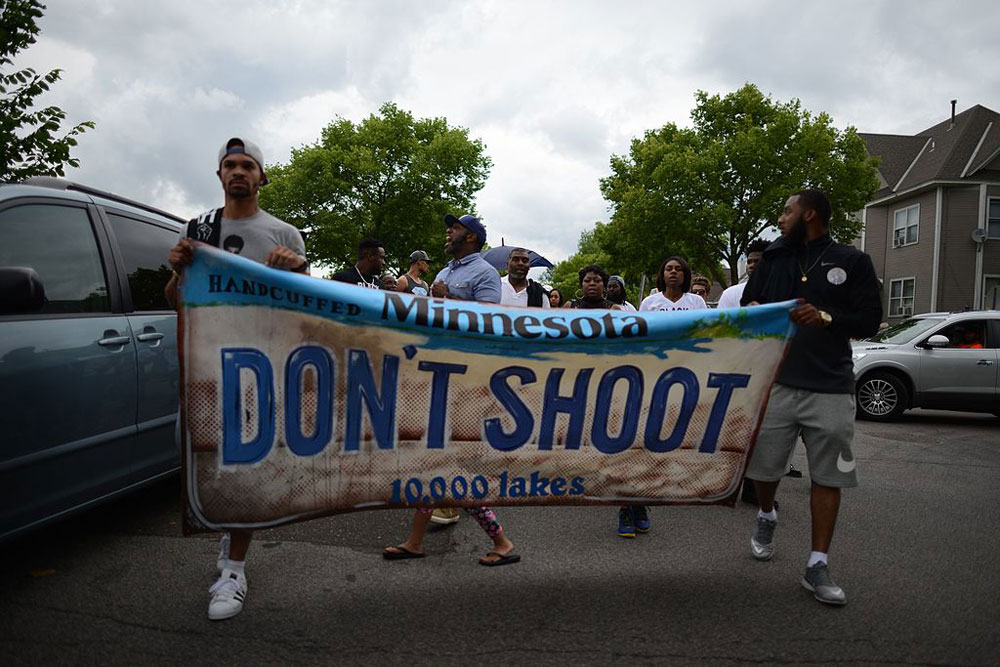
May 28, 2020; The Marshall Project
Before George Floyd, there was Philando Castile. Back in 2016, as many NPQ readers will recall, Castile was killed by Minneapolis police on July 6, 2016, after having his car pulled over because of a broken taillight.
Writing for The Marshall Project, Jamiles Lartey and Simone Weichselbaum note that the footage of Floyd’s execution must have seemed horribly familiar to “Valerie Castile, who four years ago watched similar footage: her son, Philando, dying after an officer from the St. Anthony police department shot him during a traffic stop in a Minneapolis suburb.”
“I’m sick over it and literally heartbroken,” Castile says of Floyd’s death. “We still have that big question: Why? Why does this keep happening and why no one is being held accountable?”
As Lartey and Weichselbaum document, the answer to Castile’s query is both simple and complicated, but it comes down to this: the culture of white supremacy within the Minneapolis police department has been stronger than the attempts to root that culture out. “The Minneapolis Police Department failed to fully adopt changes recommended by federal officials to weed out bad cops,” they write. “At least two of the officers involved in Floyd’s fatal encounter, including the officer who knelt on his neck, had complaints filed against them in the past.”
Efforts to “reform” the city’s police actually date back to 2012, when newly appointed police chief Janeé Harteau vowed to overhaul the force. Harteau, the city’s first top cop who was a woman and also openly gay, billed herself as a reformer and invited the US Justice Department to review the police force to help it improve its accountability and community trust.
The Justice Department produced a “diagnostic analysis” in 2015, but recommended only tepid changes, such as a recommendation that the city police department automate its system of flagging poorly behaved officers and revamp an alternative-to-discipline “coaching” program.
Sign up for our free newsletters
Subscribe to NPQ's newsletters to have our top stories delivered directly to your inbox.
By signing up, you agree to our privacy policy and terms of use, and to receive messages from NPQ and our partners.
Lartey and Weichselbaum observe that, “Those steps, and inviting the federal review in the first place, won praise from some national advocates of policing reform. But some important things were left undone: the department did not fully revise its policy on neck restraints, a police technique that was already under fire across the nation for other lethal incidents….lethal choke holds are also deemed acceptable when deadly force is legally justified.”
And even the policy changes made seemed to have been implemented at best haphazardly. Derek Chauvin, the 19-year veteran officer charged with the murder of George Floyd, “racked up a dozen complaints from the public, none of which led to discipline.”
State Attorney General Keith Ellison observes that the “reforms thus far have been halting, inadequate, and just put it on the shelf until we get to the next tragedy.”
Ellison says that he knows that cultural change is required, but he believes policy changes can help push that along. In February, a working group convened by Ellison leads alongside the state’s public safety commissioner John Harrington released 28 recommendations including new training standards and independent investigations into the use of deadly force.
But changes require state legislature approval. Lartey and Weichselbaum write that, “Since 2015, elected leaders have proposed more than a dozen police reform bills but failed to pass or substantially advance any of them.”
Asked what he would tell people like Castile, who have expressed frustration and feel that little or nothing has changed, Ellison replied, “I only got one thing for Valerie in that regard. We have to try. I’m not going to tell her something has changed. I’m going to tell her we’re going to try to change it.”—Steve Dubb












